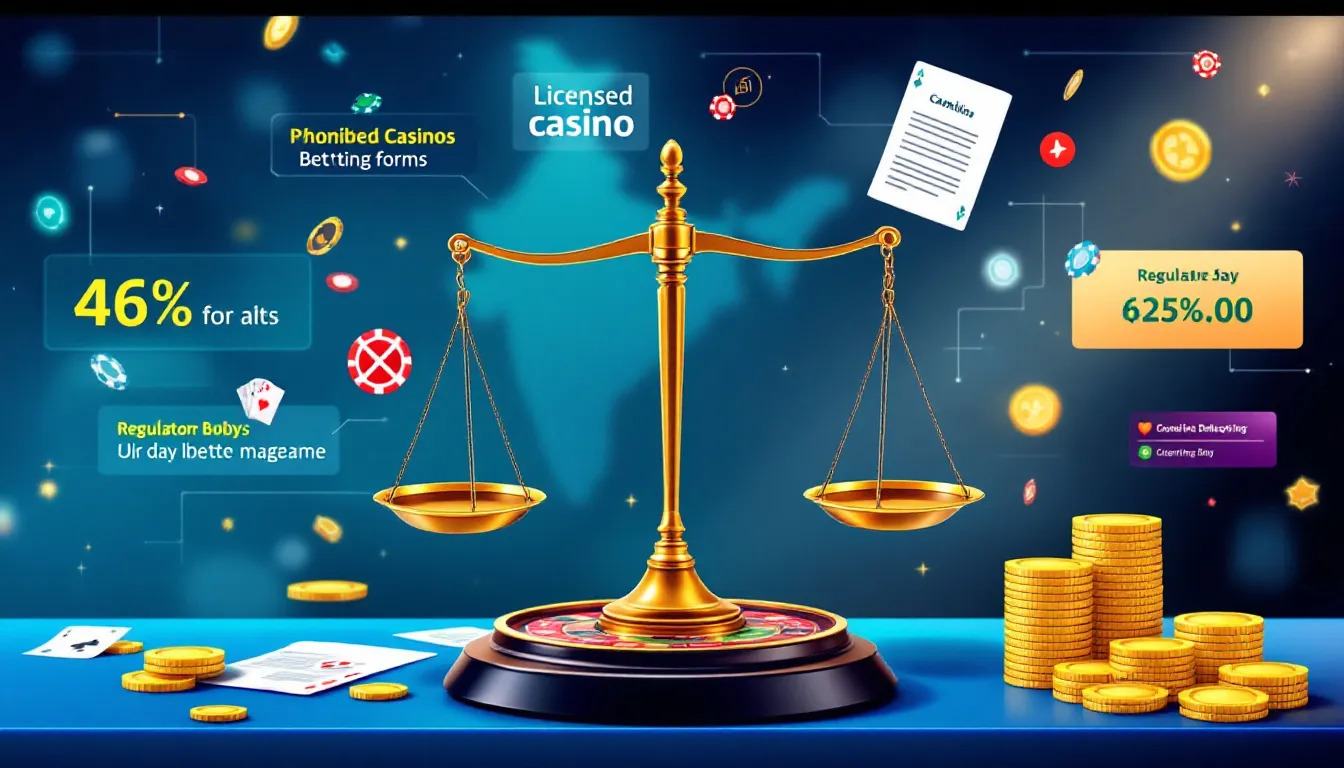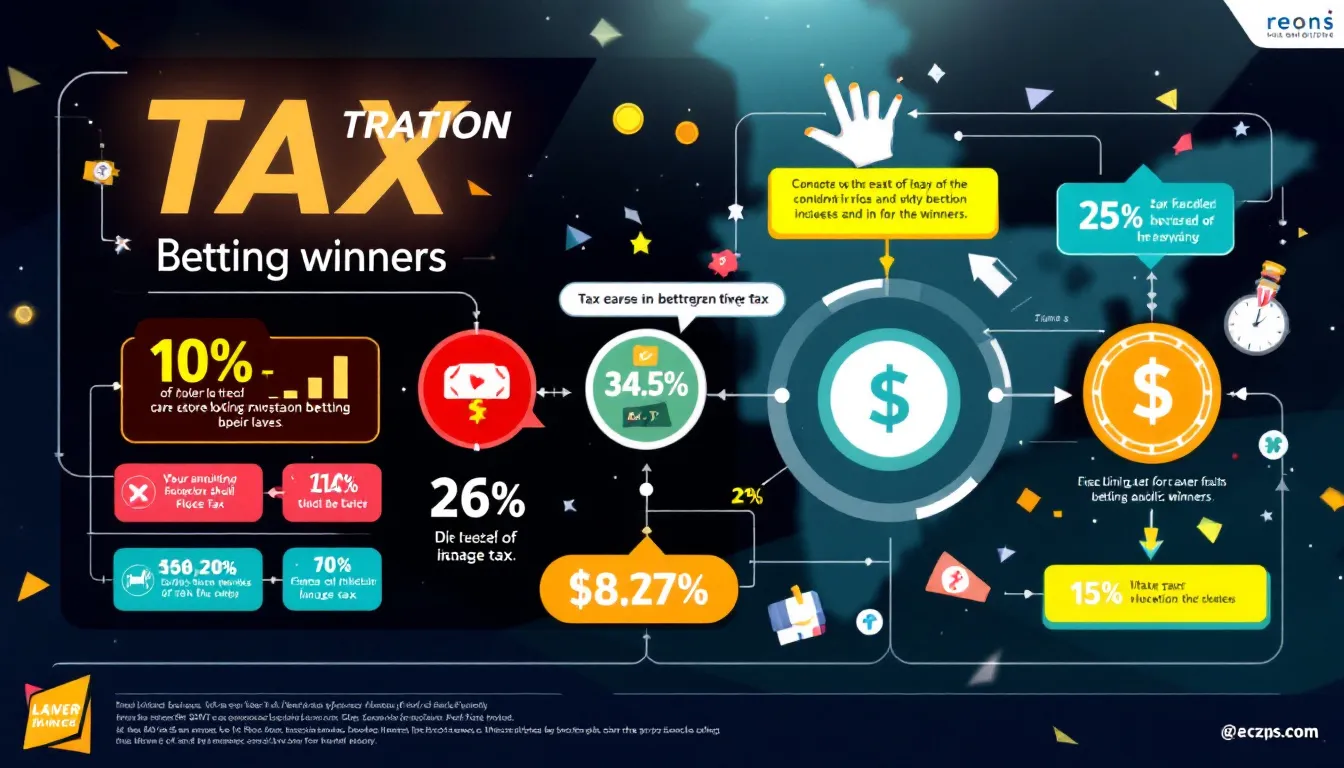Is betting legal in India? The short answer is: it’s complicated. Traditional betting falls under the Public Gambling Act of 1867, which primarily addresses physical gambling and leaves online betting in a gray area. This article explores the current legal landscape, including central and state-specific laws, and what regulation means for both offline and online betting.
Key Takeaways
- The legal framework for betting in India is fragmented, with individual states empowered to create their own regulations, resulting in varying laws across the country.
- Online betting, while popular, exists in a gray legal area and is often associated with illicit activities, necessitating clearer regulations for compliance and taxation.
- The distinction between games of skill and games of chance is crucial in determining the legality of betting activities, influencing various judicial decisions and regulatory approaches.
Definition of Betting in India
Betting, in its simplest form, is a structured agreement predicting outcomes, particularly within gambling activities. Whether it’s the thrill of sports betting or the allure of casino gambling, the essence of betting lies in predicting the result and wagering something of value on it. This structured agreement is not just a modern phenomenon; references to gambling in India can be traced back to ancient texts like the Rigveda and Mahabharata, highlighting its deep-rooted presence in Indian culture.
Popular activities in betting today include sports betting, where individuals predict the outcomes of sports events such as cricket and football and other sports games. This form of betting has gained immense popularity, especially with the rise of online sports betting platforms that offer online betting convenience and accessibility. The Indian Premier League (IPL) has particularly fueled this interest, making sports betting a household term.
To understand the betting landscape, one must consider the essential components that define gambling: consideration, risk, and outcome. These elements are crucial as they help differentiate between various forms of betting and gambling activities. The presence of these components shapes the legal interpretations and regulatory frameworks surrounding betting in India.
Legal Framework Governing Betting

The legal framework governing betting in India is a complex tapestry woven with central and state laws. At the heart of this framework lies the Public Gambling Act of 1867, a piece of legislation that primarily addresses physical forms of gambling. This Act, however, does not explicitly mention online betting, leaving a gray area that has led to various interpretations and legal challenges.
The Constitution of India empowers individual states to legislate on betting and gambling activities, resulting in a diverse legal landscape. Each state has the authority to create its own laws, leading to a patchwork of laws that vary significantly from one region to another. This fragmented nature poses challenges for operators who must navigate the complex web of state-specific regulations to ensure compliance.
Despite the evolution of online gambling regulations, the diu public gambling act remains a cornerstone of betting laws in India. The Act’s lack of clarity on online betting has prompted calls for modernization to address contemporary issues like compliance and taxation. As the industry grows, so does the need for a cohesive legal framework that can effectively regulate betting and gambling activities while fostering a safe and fair environment for all stakeholders, as highlighted by the it act and the prize competitions act.
State-Specific Betting Laws
State governments in India have the authority to create their own regulations regarding gambling, leading to a diverse legal landscape across the country. Goa is a prime example, where casino games are permitted in specific five-star hotels and floating casinos. Casinos were legalized in Goa in 1976, and the Home Department supervises and regulates their operations, ensuring compliance with local laws and casino licenses.
Sikkim offers another unique perspective with its Sikkim Online Gaming (Regulation) Act, 2008. This legislation allows for online casino sikkim gaming and sports betting under strict regulatory control. The Directorate of Sikkim State Lotteries oversees compliance and licensing for both offline and online gaming, providing a robust framework for regulated gambling activities.
However, not all states are as open to gambling. Tamil Nadu, for instance, has implemented a ban on online gambling, focusing on prohibiting games of chance like poker and rummy. Similarly, Meghalaya’s 2021 gambling law provides a regulatory framework for both online and land-based casinos, reflecting the state gaming laws prohibit approach to balancing regulation and prohibition.
These examples highlight the diverse approaches states take in regulating betting and gambling activities, making it essential for operators to stay informed about state-specific laws.
Online Betting Regulations

Online betting regulations in India are a rapidly evolving field, influenced by technological advancements and changing consumer behaviors. While no explicit law makes online betting illegal, it is often associated with illicit activities, including money laundering, creating a murky legal environment. The Reserve Bank of India plays a crucial role in managing electronic payment systems under the Payment and Settlement Act 2008, mandating financial institutions not to process transactions associated with online money games under the new regulatory framework.
Providers of online gaming must register under the Simplified Registration Scheme under the Integrated Goods and Services Tax Act and the gaming act. From October 1, 2023, a 28% GST applies to online gaming services, reflecting the government’s effort to regulate and tax this burgeoning industry. The online gambling market in India is projected to grow significantly, indicating strong market potential driven by the popularity of mobile sports betting.
Despite the market’s growth, regulatory challenges persist. The lack of explicit laws addressing online betting leaves room for interpretation, making it essential for operators to navigate the complex regulatory landscape carefully on online betting platforms.
As the industry evolves, there is a growing need for clear and comprehensive online gaming rules that can ensure a safe and fair environment for both operators and consumers, especially in light of increasing cyber activities.
Skill vs. Chance in Betting
In India, it is important to differentiate between games of skill and games of chance. This distinction plays a key role in deciding the legality of betting activities. This distinction shapes the regulatory landscape and influences judicial decisions. Betting on horse races, for example, is recognized as a game of skill and is thus exempt from gambling categorization under Indian law. The Supreme Court of India has classified horse racing, dog racing, and rummy as games of skill, highlighting the legal nuances in betting activities. The horse race is a prime example of this classification.
Fantasy sports, such games as those offered by Dream11, have also been classified as games of skill and skill gaming. Recent judicial views have supported this classification, emphasizing the role of player knowledge and strategy in determining outcomes. The Supreme Court has consistently upheld that games like Rummy requires considerable skill, as players must employ strategies to succeed, further distinguishing them from games of chance.
Indian jurisprudence relies heavily on this distinction, with games of skill not falling under the purview of gambling laws. This legal interpretation provides a framework for understanding the complexities of betting regulations and highlights the legal implications of skill in determining the legality of various betting and gambling activities.
Fantasy Sports Legality

Fantasy sports have carved out a niche in the Indian betting landscape, often classified as games of skill and thus deemed legal under current Indian law. Platforms like Dream11 have capitalized on this classification, offering a legal and regulated avenue for sports enthusiasts to engage in fantasy betting. Court rulings have consistently upheld the view that fantasy sports are games of skill, reinforcing their legal status and providing a clear framework for operators.
While most states do not require a license to operate fantasy sports, Nagaland mandates a license if the game does not qualify as a game of skill. This distinction ensures that only skill-based games are legally permissible, maintaining the integrity of the betting and gambling industry.
As fantasy sports continue to grow in popularity, their legal framework remains a testament to the importance of skill in determining the legality of betting activities.
Taxation on Betting Winnings

Taxation on betting winnings in India is governed primarily by the Income Tax Act, 1961. Starting from the assessment year 2024-25, a 30% income tax will be levied on net winnings from online games, reflecting the government’s effort to regulate and tax this growing industry. Tax obligations must be settled before the release of winnings, whether in cash or kind, ensuring compliance with tax regulations.
In addition to income tax, the Goods and Services Tax (GST) applies to online gaming and gambling activities, set at 28%. The Central Board of Indirect Taxes and Customs is responsible for implementing this tax, encompassing a wide range of services related to betting and gambling. This dual taxation framework aims to ensure comprehensive tax compliance and revenue generation for the government.
State taxes may also apply on top of federal taxes, varying by jurisdiction. Individuals engaging in betting and gambling activities must be aware of both income tax and GST implications when claiming winnings, ensuring they meet all legal and tax obligations.
Regulatory Bodies and Their Roles
Several regulatory bodies oversee betting and gambling activities in India, each playing a crucial role in ensuring compliance and regulate gambling. The central government plans to establish an Online Gaming Authority to oversee online gaming compliance and regulation, reflecting the growing importance of this sector. The Ministry of Electronics and Information Technology also oversees online gaming regulations under the Information Technology Act, highlighting the intersection of technology, online gambling activities, and gambling regulations.
State-specific bodies also play a significant role. Nagaland’s Finance Commissioner, for instance, oversees the regulation of online skill-based gaming, ensuring compliance with state laws. Similarly, Goa’s Home Department regulates the licensing and operations of both land-based and offshore casinos, providing a robust framework for regulated gambling activities under the state government.
These regulatory bodies work together to create a comprehensive regulatory environment for betting and gambling in India.
Legal Challenges and Notable Court Cases
Legal challenges and notable court cases have significantly shaped the betting landscape in India. The Supreme Court of India is set to address legal challenges against a recent law that bans real-money online gambling, including poker and rummy. Critics argue that such bans could push players towards illegal, unregulated operators, raising concerns about consumer protection and regulatory efficacy.
One notable case involves the Indian gaming company A23, which claims that the ban is unconstitutional when it comes to skill-based games. Legal experts suggest that bans on gambling often face scrutiny in courts, which may consider less restrictive alternatives to address concerns like addiction and financial distress.
These legal battles highlight the ongoing debates and uncertainties surrounding betting regulations in India.
Social and Economic Impact
The social and economic impacts of betting in India are multifaceted, with both potential benefits and significant concerns. Proponents of regulated gambling argue that it serves as a source of revenue for the state, with potential benefits including revenue generation and curbing black-market activities. Legalizing sports betting could also provide a structured and transparent framework for betting activities, contributing to economic growth.
However, opponents express concerns about the potential negative social consequences of legalizing sports betting. Issues like addiction and exploitation are significant concerns, especially given the rising number of young individuals engaging in online gambling. Online betting apps have contributed to a growing addiction problem, with some individuals experiencing severe financial distress and mental health issues.
Celebrity endorsements and social media promotions of betting apps are normalizing gambling among younger audiences, leading to greater risks. The impact on family dynamics is also a concern, as financial losses can lead to significant stress and strain on relationships. Balancing the social and economic impacts of betting, including aiding gambling, remains a critical challenge for policymakers.
International Comparisons
Comparing India’s betting regulations with those of other countries can provide valuable insights into potential regulatory approaches. The United Kingdom has a well-regulated gambling industry. This sector makes a significant contribution to its economy. Studying the regulatory frameworks of countries like the UK can offer lessons for India, particularly in terms of balancing regulation and consumer protection.
International comparisons highlight the importance of a cohesive and comprehensive regulatory framework. By learning from other countries’ experiences, India can develop a more effective approach to regulating betting and gambling activities, ensuring a safe and fair environment for all stakeholders.
Future Outlook for Betting in India

The future of betting in India is a topic of ongoing debate, driven by evolving market dynamics and regulatory considerations. Governments are considering newer regulations and blanket bans due to the growth of the gaming industry. The Promotion and Regulation of Online Gaming Bill, introduced in 2025, aims to boost innovation while banning harmful online money games. This proposed legislation seeks to enforce restrictions similar to those already established for physical gambling activities.
There is a growing recognition of the need for reform in sports betting regulation in India, driven by the industry’s rapid growth and the potential for revenue generation. Diverse perspectives and potential implications must be considered while discussing the future of sports betting in India, as the industry continues to evolve. A spate of litigations has prompted courts to engage with state governments regarding the need for compatible gaming legislation.
The future outlook for betting in India remains uncertain, with ongoing debates and potential reforms shaping the industry’s trajectory. As the market grows, the need for a cohesive and comprehensive regulatory framework becomes increasingly apparent.
Summary
In summary, the legal landscape of betting in India is complex and multifaceted, influenced by a mix of central and state laws. The distinction between games of skill and games of chance plays a crucial role in determining the legality of various betting activities. Fantasy sports have emerged as a significant player, benefiting from their classification as games of skill.
Taxation and regulatory compliance are critical considerations for individuals and businesses engaged in betting activities. The social and economic impacts of betting highlight the need for a balanced approach that addresses both potential benefits and significant concerns. By learning from international comparisons and considering diverse perspectives, India can develop a more effective regulatory framework for betting and gambling activities.
The future of betting in India remains a topic of ongoing debate, with potential reforms and new regulations shaping the industry’s trajectory. As the market continues to grow, the need for a cohesive and comprehensive regulatory framework becomes increasingly apparent, ensuring a safe and fair environment for all stakeholders.
Frequently Asked Questions
Is betting income legal in India?
Betting income in India is subject to taxation under the Goods and Services Tax (GST) and the Income Tax Act of 1961, with a tax rate of 28% applied to the total transaction value. Therefore, while betting can be legal, it is imperative to comply with the applicable tax regulations.
Is online betting legal in India?
Online betting is currently illegal in India due to a parliamentary bill that bans various forms of online gambling, impacting card games, poker, and fantasy sports platforms. This reflects the government’s concern over significant financial losses incurred by its citizens.
What are the taxation rules for betting winnings in India?
Betting winnings in India are taxed at a rate of 30% under the Income Tax Act, 1961, along with an additional 28% Goods and Services Tax (GST) on online gaming services. Thus, substantial taxes apply to these winnings.
Are fantasy sports considered legal in India?
Fantasy sports are considered legal in India, as multiple court rulings have classified them as games of skill. Therefore, participants can engage in fantasy sports without legal concerns.
How do state-specific laws affect betting in India?
State-specific laws significantly impact betting in India, as each state can enact its own regulations, resulting in a patchwork of legal environments. For example, while Goa allows casinos, Tamil Nadu has implemented a ban on online gambling.













